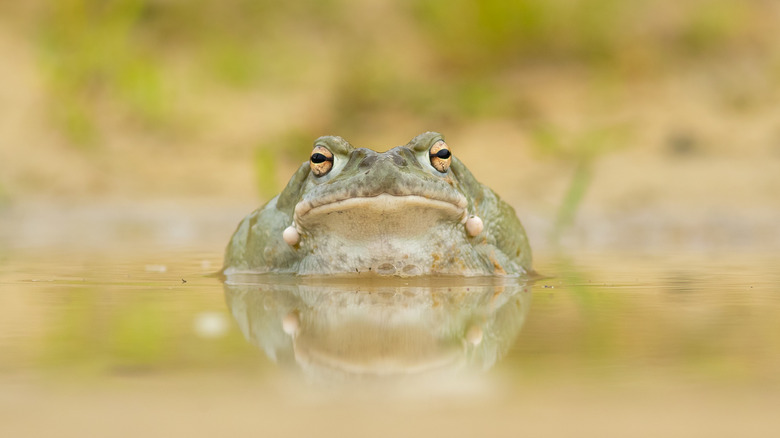The Time The National Park Service Had To Tell People To Stop Licking A Wild Toad
Popsicles, lollipops, and candy canes are all things we like to lick, but how did it ever come to be that the National Park Service (NPS) had to issue a warning about licking a particular toad? Turns out, it's not just any toad — it's the Sonoran desert toad, also known as the Colorado river toad. These nocturnal toads are some of the largest in North America and they can be found in central Arizona and New Mexico and even in parts of Mexico (via Desert Museum).
The Sonoran desert toad is unique among amphibians because its skin secretes a toxin. Now, you might think that most people would try to avoid a toad that releases toxins, but not this toad. The reason why is that venom contains highly-sought after psychoactive chemicals. While the toxin is meant for self-defense, humans consume it for a euphoric, hallucinogenic experience, per Reptiles Magazine.
Blame it on 5-MeO-DMT
The psychedelic venom of the Sonoran desert toad is called 5-MeO-DMT. When smoked, 5-MeO-DMT can cause short, intense psychedelic experiences that are similar to psilocybin and DMT, according to Drug Science. Not only that, but The Third Wave reports that the venom also contains the compound 5-HO-DMT which, when combined with 5-MeO-DMT, offers a unique blend of psychedelic and hallucinogenic effects.
And that's where the trouble begins for the toad. People looking to have a psychedelic experience have reportedly resorted to licking the critters in order to ingest the toxins, according to Verywell Mind. That, along with the fact that simply handling the toad can make you sick, has created problems for the toads and people alike. For one, the toad is considered a threatened species in New Mexico, per NPR. The issue became such a problem that in October 2022, the NPS felt compelled to ask people to refrain from licking the toads.
Licking the toad will probably only make you sick
5-MeO-DMT is illegal in most countries, but that doesn't stop people from experimenting with it. And this isn't something new. Drug Science reports that the chemical has been used in some form or another for some 3,000 years. More recently, it has gained attention after several celebrities discussed the positive effects of using the drug (via NPR). There's even an interest in studying the chemical for treating depression and substance abuse disorders, per Verywell Mind.
However, licking the toad in hopes of experiencing a euphoric experience will probably only lead to sickness. The venom needs to be carefully extracted from the toads' parotoid glands. After a drying-out process, smoking the venom is the only way to achieve a psychoactive effect (via The Third Wave). Any other means of ingesting the chemical has resulted in poisoning and even death, according to Reptiles Magazine.


